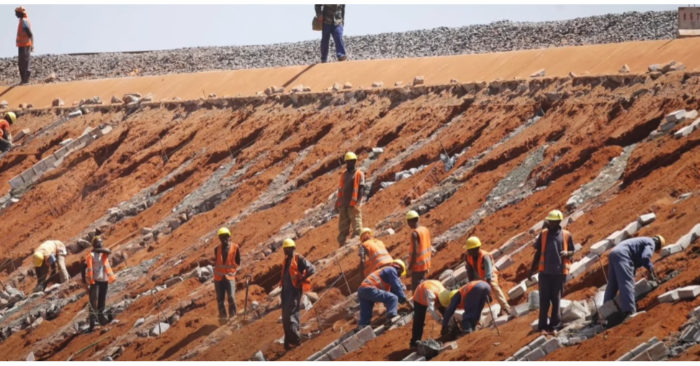Human trafficking and abuse: China's Belt and Road Initiative – The BL – TheBL.com

The U.S. State Department on July 19 released its annual Trafficking in Persons Report. It held China and 10 other countries responsible for enabling human trafficking within their borders.
According to U.S. Secretary of State Anthony Blinken's estimate, 25 million individuals continue to be victims of trafficking worldwide.
This year's report began with a section on state-sponsored trafficking. It identified the 11 governments of China, Russia, North Korea, Cuba, Iran, Syria, Afghanistan, South Sudan, Burma, Eritrea, and Turkmenistan as having a “government policy or pattern” of trafficking and human rights abuses. In addition, Russia was listed among the countries employing child soldiers in the context of the war in Ukraine.
The report identified five topics of “grave and urgent concern.” These included forced labor through China's Belt and Road Initiative (BRI), better integration of government data collection on human trafficking, efforts to combat trafficking-related corruption, climate-related exploitation, and the transition to clean energy in global supply chains.
The State Department accused China of “state-sponsored forced labor programs targeting predominantly Muslim Uyghurs and members of other ethnic and religious minority groups amid the ongoing genocide and other crimes against humanity” in the Xinjiang Uyghur Autonomous Region. The area produces silicon metal for global supply chains.
The report also accused China of allowing the continuation of BRI worksite abuses and sex trafficking.
BRI projects involve at least 144 countries in Africa, Europe, the Middle East, Asia, the Pacific, Latin America, and the Caribbean, perpetrated fraudulent recruitment, arbitrary reduction or withholding of wages, and contractual violations. They also subjected workers to poor working and living conditions, lack of emergency medical care, intimidation, threats, violence, and restricted freedom of movement and communication.
The report mentioned a case of a Chinese worker hired by the BRI project in Indonesia last year, promising high-paying work. However, when he arrived in Indonesia, his passport was seized, then he found he was contracted for a longer term on lower wages. Within months, he fled from his workstation to post covert photos of himself online and handwritten notes begging for someone to take him home. His family attempted to persuade the factory to return his passport by contacting the local Chinese consular services, but to no avail.
He and four other workers eventually pooled their funds to hire a national broker to help them leave the country. However, the broker took their money and brought them to yet another Chinese industrial park in Indonesia, where they were forced to work for months in similarly abusive conditions.
They continued saving money until they could pay a smuggler to take them to Malaysia. Unfortunately, the smuggler threw them in the water off the coast when they reached there. They had to swim to shore, where local law enforcement shot at them, then arrested and detained them.
The report also mentions the experiences of Chinese citizens Li Wei and Mao Chen. They were duped into traveling to Indonesia, where their employers took their passports, forced them to work 16 hours a day without pay, and forced them to live in tiny spaces while being watched over by armed guards. A subcontractor took over Li Wei and Mao Chen's “contract” a few months later, forcing them to work long hours. While Mao kept up his hard work, Li Wei escaped but was stranded in Indonesia because he had no money or passport.
According to the report, incidents like these often occur in many BRI countries. The Chinese regime has not established a central governing body for the BRI or made public a complete list of all projects connected to the BRI. Many of these vulnerabilities increased during the COVID-19 epidemic when the regime enforced local travel restrictions, slower recruiting procedures, and reentry bans to prevent employees from leaving and reporting abusive conditions. For instance, nearly half of the Chinese workers at one BRI project in Papua New Guinea reported being unable to return home in 2021 due to the pandemic.
The report also downgraded Vietnam, Cambodia, Brunei, and Macau to a human trafficking blacklist because they lacked efforts to stop forced prostitution and assist migrant labor.
In conclusion, the U.S. annual Trafficking in Persons report shows the dark curtain behind China's international projects more clearly seen by the global public. The miserable and persecuted lives of the Chinese people under the regime of China in general and communist and developing countries, in particular, are clearly revealed.
This “Eyes on Trafficking” story is reprinted from its original online location.
 ABOUT PBJ LEARNING
ABOUT PBJ LEARNING
PBJ Learning is a leading provider of online human trafficking training, focusing on awareness and prevention education. Their interactive Human Trafficking Essentials online course is used worldwide to educate professionals and individuals how to recognize human trafficking and how to respond to potential victims. Learn on any web browser (even your mobile phone) at any time.
More stories like this can be found in your PBJ Learning Knowledge Vault.
EYES ON TRAFFICKING
This “Eyes on Trafficking” story is reprinted from its original online location.
ABOUT PBJ LEARNING
PBJ Learning is a leading provider of online human trafficking training, focusing on awareness and prevention education. Their interactive Human Trafficking Essentials online course is used worldwide to educate professionals and individuals how to recognize human trafficking and how to respond to potential victims. Learn on any web browser (even your mobile phone) at any time.
More stories like this can be found in your PBJ Learning Knowledge Vault.
